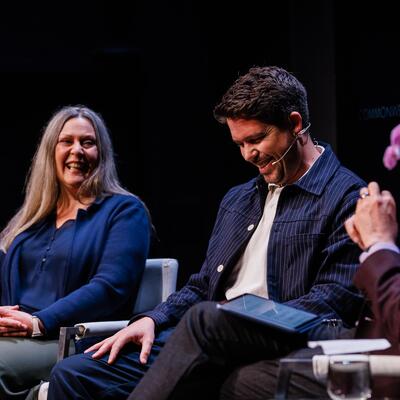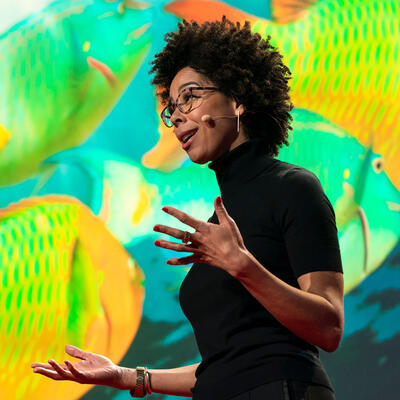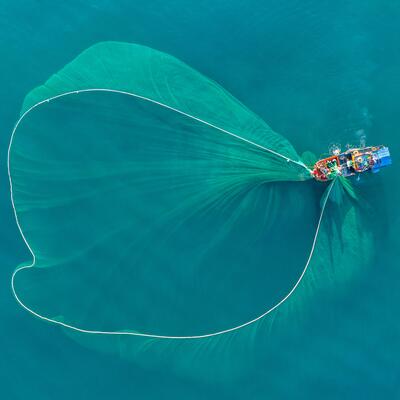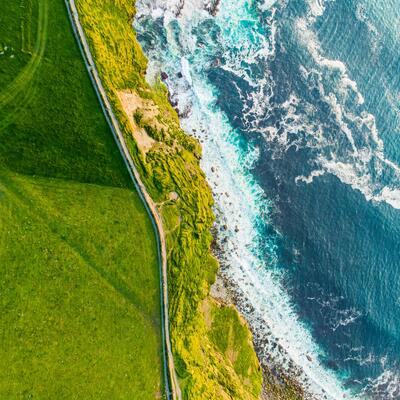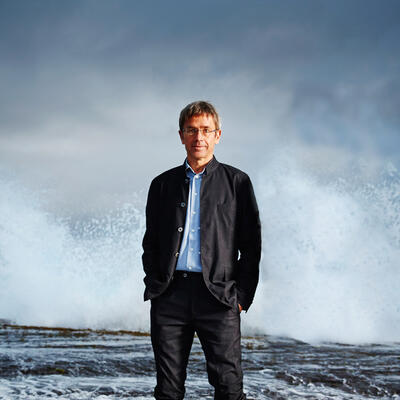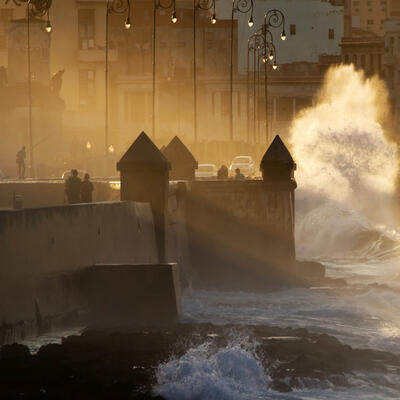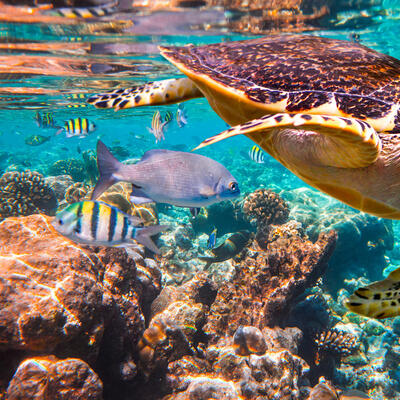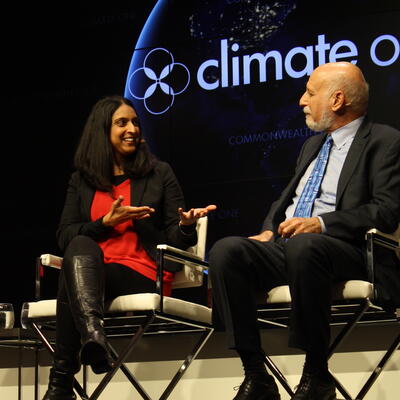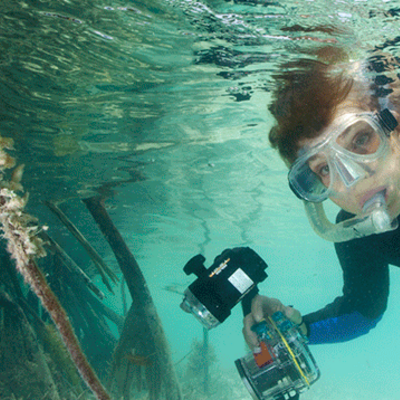
Sylvia Earle on the Health and Wonder of Our Seas
Guests
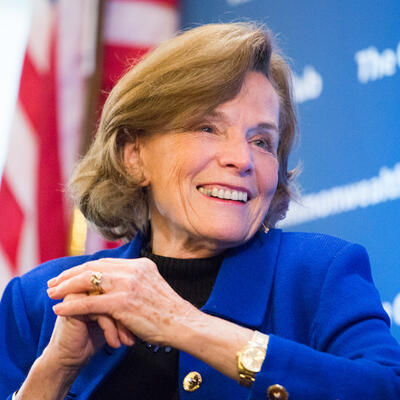
Sylvia Earle
Summary
As the health of our oceans go, so goes the health of our planet. But climate change, overfishing and pollution have taken their toll – what can we do to help?
Sylvia Earle, National Geographic Explorer in Residence
Full Transcript
Greg Dalton: I'm Greg Dalton. And today on Climate One, my guest is Sylvia Earle, ocean scientist, explorer, teacher and advocate. In the 1950s and 60s, she became the first woman to paddle into the world of ocean research, dominated by bearded men in plaid shirts. In 1969, she applied to join a research team living in an installation 50 feet below the sea surface in the Virgin Islands. She was rejected even though she had logged more than a thousand research hours underwater. The next year, she was selected to lead the first all-female team of aquanauts at the station. We’ll see a little video clip of that later. In 1990, Sylvia Earle became the first woman to be appointed chief scientist at the National Oceanic and Atmospheric Administration. She’s won more than 100 awards, including a TED Prize and 2014 Glamour Woman of the Year.
[Applause]
Greg Dalton: Over the next hour, I will explore the health and wonder of the seas with the Joan of Arc of the Oceans. Along the way, we'll include questions from our live audience here at the Commonwealth Club in San Francisco. Please join me in welcoming Her Deepness, Sylvia Earle, to the Commonwealth Club.
[Applause]
Sylvia Earle: Thank you.
Greg Dalton: Dr. Earle, welcome to Climate One. I'd like to begin by citing an eminent scientist named Stephen Colbert who asked you and said about the oceans, "The oceans are deep, they are dark, people drown in them, and they are full of sharks who want to eat us." So why should a person who's not into the oceans, like you are, care so much about the oceans. Why do they matter?
Sylvia Earle: Well, if you like to breathe, you'll listen up among other things. More than half of the oxygen in the atmosphere is generated by little green guys out there in the ocean. They also take up a lot of carbon which is very relevant to the climate issues that we're here to talk about in part. So no water, it starts with the water, no life. 97% of earth's water is ocean, but we don't drink saltwater. Well, some of us do a little bit. But the water that you see in clouds, it's largely generated out there over the ocean. It falls back to land and sea, regenerating the freshwater. Only 3% of earth's water is what we call freshwater and most of that is locked up in polar ice, most of it in Antarctica. So no water, no life. You care about the ocean, you care about living, it kind of connects.
Greg Dalton: And 60 years ago, you started to explore the oceans. You described it as sort of a wonderful Sea of Eden. What were the oceans like 60 years ago when you first explored their wonders?
Sylvia Earle: Well, I tell people sometimes that I come from a different planet. And they say, "Well, yeah, we know that." We thought about that. But it was a different planet. And then certainly, although from the surface, the ocean looks pretty much the same today as it did half a century ago, under the surface, much has changed. In that time on the order of 90% of many of the big fish have been extracted from the sea. We’re so good at taking them; we're getting better and better at finding them, extracting them, marketing them, and cooking them and eating them that the natural systems cannot replenish at the rate that we're extracting. So that's one thing.
We have seen an avalanche of debris like plastics enter the ocean. I come from the pre-plasticzoic. No plastic bags, no Ziplocs. I mean, Ziplocs are so handy and not just that brand, but we've become seduced by their convenience. I don't blame the plastics. We should look at the mirror and say, "Well, what are we thinking when we just throw things away?" There is no “away.” In fact the ocean is, by and large, the "away" where a lot of the stuff that we toss eventually winds up. Both the things you can see, the tangible things, but also the things you cannot see, the chemical changes in the ocean itself.
So look at the trends. Half a century ago, if you take that as a starting point for where coral reefs and kelp forests were, their decline globally is on the order of about half. It's not just warm water; it's cold water systems too. And that's just the areas that we can see. What we're now learning is that corals, deep water corals, thousands of feet beneath the surface, not the same species as what you see in Cousteau films and National Geographic films too, I have to say as National Geographic Explorer in Residence. I have to plug my institution.
But the decline is heartbreaking. But the good news is that some of us have been around long enough to see the changes, the shifting baseline, as some of my fellow scientists have come to call the changes. We're witnesses, all of us are, to the most extraordinary time in all of human history at least, and the changes are not all bad. We have seen so much that benefits us as human beings, but there's been a cost that we haven't properly been accounting for on the land, in the air and certainly in and under the ocean.
Greg Dalton: You grew up in New Jersey and then Florida. I'm interested in sort of the early days. Your mother was a bird lady who take care of wounded animals.
Sylvia Earle: She's a critter person.
Greg Dalton: And she went for her first dive at 81, is that right?
Sylvia Earle: That's right.
Greg Dalton: Okay.
Sylvia Earle: "If you're 81, don't wait any longer," that's what she said. Get with it.
Greg Dalton: So for everyone in the audience, there's still a chance if you haven't taken the plunge yet. But tell as a little bit about your awakening and wonder to the natural world. You were kind of what we would today call a free-range kid running around in nature.
Sylvia Earle: I think all kids start out as explorers. I think even all of you, whoever you are or wherever you are, you don't lose that part of being a kid, asking questions who, what, why, where, when, how. That's what explorers do. That's what scientists do. I don't know where along the way we sort of get off track and start sort of accepting what we're told rather than saying, "Well, how do you know that? Show me the evidence." Or, "Why is the sky blue?" That's a kid question. "How deep is the ocean?"
The fact is, we don't actually know precisely. Although thanks to James Cameron, who went down in his little submarine and cruised along, taking measurements over a couple of hours, as the best measurement that we have so far. But it's still kind of squishy. It could be a little bit this way or a little bit that way. With Mount Everest, we know precisely how high places on the land are. But anyways, so kids ask embarrassing questions. Why do we stop? Why do we stop?
So I think I had parents who didn't discourage me from asking questions and often saying, "Well, let's find out," instead of saying, when you don't know something, that's okay. Let's find out. Where does this frog live? You can see it hopping around on the shore. Where does it live? Well, be an investigator, but there are so many things. Back to the climate thing, I get asked "Do you believe in climate change?" My answer is, "I do not believe or disbelieve." That's not the question. The question is, I look for evidence and you can do that too. Ask the questions. Why do people think that the planet is warming?
Well, they've been taking the temperature of the planet, measurements. Here's the evidence. Look at the evidence because that's what -- I don't think my mom and dad ever were trying to coach me to become a scientist, they were just following maybe the things that they were curious about themselves. And they let me run around on my own which is great, and my brothers too. So it was a different time, a different planet, if you will.
I'm not sure I feel as comfortable with my own kids and now my grandkids doing the things I did as a child. It's not fear of getting wet or muddy or encountering beetles and earthworms and things of that nature, I certainly did. But I have reason to be concerned about my species and we live in different times.
Greg Dalton: So I'd like to show a clip from a different time. This is a clip from Mission Blue about the time when you were on the research expedition. Is it Tektite? Is that right?
Sylvia Earle: That's right.
Greg Dalton: So let's watch this video and then I'll have you respond to it. Listen to this from Tektite.
[BEGIN CLIP]
Male Speaker: Now a team of divers will attempt to live for two weeks as quiet residents on the seafloor. Ironically, these aquanauts are not men with extraordinary physical endurance and stamina, but five young and attractive women. The world's first real-life mermaids. Their leader is a renowned scientist, Dr. Sylvia Earle, a marine botanist and an experienced diver.
[END CLIP]
Greg Dalton: That's Dr. Sylvia Earle in a clip from the 1970s kind of breaking into the man's world. We kind of laughed, kind of cringed there, but I'd like to know about sort of what you encountered there, some of the sexism you've encountered in trying to get into research science.
Sylvia Earle: Well, I wasn't trying to knock down barriers, I responded to a notice that was on the bulletin board when I was at Harvard as a post-doctoral student and still a student. It just didn't say that women need not apply, and some of us did.
There were no women astronauts in 1969. There were footprints being put on the moon but they're all guys. And women who did apply to become astronauts were well-qualified, but there was just this aura of it's not a place for women. So it was natural, I suppose, that those who were behind the Tektite program that included NASA, included the Navy, included the Department of Interior -- the National Oceanic and Atmospheric Administration (NOAA), did not exist when that program started, but it did as the program came to a close in 1970.
But the applications that came in, mine included, were I guess at least as good as those of the men. And so the head of the program, James Miller, I think he had a really good marriage and he and his mom got along really well. Because when the decision had to be made, shall there or shall there not be women, "What are we going to do with these applications? They are well-qualified." And he said, at least it is said that he said, "Well, half the fish are female, maybe we could put up with a few women." And so they did and they more than.
But we thought when I applied, I applied with some of my fellow scientists and they're all guys. I work in a laboratory. I ride in airplanes. Men and women work together usually pretty well, and had been my experience. Although I was the first - not the first, the only woman with 70 men on a research vessel in 1964. And at the time, I thought, "Well, some people think this is unusual, but imagine if the guys were asked if they could go to sea with 70 women, would they object to that?" I don't think so.
Greg Dalton: And you've been a pioneer in what we now call STEAM - science, technology, engineering, arts and math careers. What do you say to young girls who are considering entering the sciences? Now there still seems to be some obstacles. The numbers are not what they ought to be.
Sylvia Earle: That's for young men and women alike, it's why not go for it. Everyone should become science literate, to be a science savvy, to use the capacity. As I say, do what you do as a kid; ask questions, demand evidence, don't just take stuff for granted. It's the scientific method. What does a scientist do? You observe carefully, you report honestly what you see, that's the basic stuff. Now there are all these rules and regulations about how you conduct experiments and have tests and so on, but the basic thing, observe carefully, report honestly. That's what scientists do.
The coolest thing of all about science and scientists I think is, they're really happy even when something new is discovered, even if it means that's something they thought they knew has been proven not to be so. I mean, it's just advancing the quality and the quantity of knowledge, the truth of really trying to get at the heart of what's actually going on. That's cool. I mean, that's how we have progressed from not having a language, not having that you could write down, that's relatively speaking in human history being able to write things down with alphabet, to be able to communicate with numbers. It's fairly new.
But generally speaking, we just are the beneficiaries of our collective learning and what we know today is unprecedented. It gives us an edge with plenty of reason for hope that we can figure things out from where we are to some better place in the future because we have this habit of figuring things out. The human mind is really a pretty wonderful thing.
I look at creatures when I'm swimming around underwater. Sometimes I see dolphins, turtles, fish, fish that get up to the surface anyway, I’m sure they have speculated or wondered about stars.
But we're the only ones who can know what a star actually is and know what our sun, to know where we fit in the greater scheme of things, and even humans couldn't know that until fairly recently. Poor Galileo had a hard time because he really tried to tell people, "We are not the center of the universe." Well, people now who still kind of think that they're the center of the universe. But here we are, this is a wonderful time to be around.
Greg Dalton: She goes deep. She dives deep, deep thinker here. If you're just joining us, our guest today at Climate One is Sylvia Earle, the ocean advocate, protector and author. I'd like to ask you about the impact climate is having on the oceans in terms of warming, acidification, what impact is climate having on the oceans and what can we do about it?
Sylvia Earle: I think I'll turn that question around so what impact is the ocean having on climate? Because climate is driven by the ocean. No ocean -- I mean take away the ocean, what have you got? A planet that's a lot like Mars, really. I mean, Mars is smaller than earth, but earth is governed very largely because we're an ocean planet. The world is blue to coin a phrase. It is. Average depth two and a half miles, four kilometers. Maximum: 11 kilometers, seven miles down.
And the ocean is where most of the action is. It's not just where most of the water is, it's where most of life on earth is. It's where the greatest diversity of life is. And but for the ocean, how could there be clouds? There might be clouds of something other than water. I mean, there are clouds on other planets, methane clouds and things, but we have a planet that is shaped, the chemistry of it, the temperature, the ocean is earth's great thermal regulator. It holds heat, releases it slowly, holds cold, releases it gradually. The air is much more flexible or more quickly responds to temperature. And so the ocean holds the planet steady.
The ocean governs climate, governs the weather. So we should be asking, "So tell us about the ocean and how it distributes heat with the ocean currents?" Think of this, that most of life on earth lives in the dark all the time - and I don't mean just places like Washington D.C. - I'm talking a thousand feet underwater or more and the average depth is two and a half miles. We're looking at the skin of the ocean that is illuminated half the time or something like half a time when the sun is around. But below that it's dark. That's where most of light and it's cold even in the tropics.
You get to 1,000 feet, there's a temperature drop of whatever it is at the surface. Maybe it's 30 degrees centigrade. At 1,000 feet, it may be 12 degrees centigrade. And you get down close to the bottom, it's near freezing, never quite freezing because if its freezing ice forms and ice is lighter than water and it comes back up to the surface. So that's part of the miracle of water that it has all these forms of ice and vapor and liquid. You see it in places like the Arctic and the Antarctic where you have all three forms right there all the time. Okay. So you asked a straightforward question.
Greg Dalton: And we're seeing more severe weather, is that impacted by changing ocean currents, rising ocean temperatures?
Sylvia Earle: It's important to recognize that earth has always been changing every day, every minute. It's always never the same at any moment as any other moment in the past or any in the future.
But the changes, generally, are gradual and sort of these changes occur at a stately pace. The geologic changes of continents moving apart, of the gradual ups and downs. I mean, there have been ice ages in the past. They have come and gone. But what we're witnessing now is accelerated warming. We're accelerating the change of chemistry of the ocean with the acidification that has happened in the past. There is evidence of this.
And so if you should ask the question, "How do you know?" Don't just accept it, dig for the answers and convince yourself of what's happening right now. And then look for the causes. Why is it happening at such a pace? And look at the correlations between what we have been able to measure providing evidence of the correlation between burning of fossil fuels, carbon dioxide in the atmosphere, how this is formed along with the exhalations of methane creating this blanket - the greenhouse effect.
It's great that we have some protective layer that makes it possible for earth to be suitable for the likes of us. But the greenhouse effect means that we are capturing the sun’s heat and holding it and accelerating this warming trend that is mostly captured and held in the ocean. So it doesn't happen like overnight; it's a gradual trend. So we're seeing temperature rise that means seawater, as it gets warmer, expands. That's part of the reason that we're seeing the increase of sea level rise. It’s partly the melting of ice, but it's also the expansion with increased warming.
So it all sounds like really bad news, ocean acidification, warming that is changing the weather, changing the climate. We're getting more variation in storms, less predictable and with the shorelines around where most people live, the greatest numbers of people who were in coastal areas vulnerable to the increased impact of storms as sea level rises and all these things. But the good news, and I think it really is the best news of all: we can see and understand that these things are happening. You can't solve problems if you don't know you've got them.
We know that one thing we need to do is understand how our prosperity has come about, how we have used the natural world to fuel ourselves to become the creatures that we are at this level in civilization.
Knowing what we know, there's a cost. We go back 10,000 years, largely as hunter gatherers. Today, we feed ourselves largely because we've mastered agriculture so most of the calories that feed us come from corn, rice, wheat and to a growing extent soy. I understand that's about 80% of the calories that people globally consume come from those four basic categories of plants.
And all the other stuff, all the animals we grow, all the wild things we take from the land and also mostly from the sea and all the other plants from apples to peaches cherries or whatever it is, that's in that 20%. If we want to look at food security, going forward, we have to think differently about how we acquire the calories to propel the numbers we’ve got, let alone, the more we're on the way, to be able to avert poverty and hunger and all the other plagues of humankind.
But we can do it because we're armed with knowledge. We don't have a lot of time to figure it out. I mean, I do think that the next decade will be really critical, the next ten years the most important perhaps in the next 10,000 years.
Greg Dalton: A decisive decade. If you're just joining us, our guest today at Climate One is Sylvia Earle, the ocean explorer and advocate. I'm Greg Dalton. We’ll be right back.
[Climate One Minute]
Announcer: And now, here’s a Climate One Minute. As Sylvia Earle tells us, change begins when we start to ask questions and take action. For actor Ted Danson, his own “aha” moment came about during a walk on the beach. He was starring on “Cheers” at the time.
Ted Danson: Mid-80s, I'm getting paid a lot of money. I'm a little guilty. What do I do? How do I be responsible? I also take a walk on the beach in Santa Monica with my daughters who are about eight and four. And the sign, you know, "No swimming. Water polluted." It was a gorgeous day. It was beautiful, crystal clear water. Couldn't go swimming, started to ask some questions. The same time, I met a man named Robert Sulnick, who was the head of No Oil Inc.
We became great friends. We wanted to continue the conversation. Naively, almost like, “my father has a barn - let's put on a play!” we decided to start American Oceans Campaign and we did. And lo and behold, it turned into a really small but respected ocean advocacy group in Washington and LA. But then 10 years ago, merged into Oceana, which is now the largest single issue marine conservation group in the world.
Announcer: Ted Danson talking with Climate One in 2011. Find out how you can help at www.oceana.org. Now, back to Greg’s conversation with Her Deepness, Sylvia Earle, at The Commonwealth Club.
[End Climate One Minute]
Greg Dalton: Now it's time for our lightning round, speed round, some fun.
Sylvia Earle: Uh-oh, this is scary.
Greg Dalton: Yes or no.
Sylvia Earle: Is there a prize for getting it right?
Greg Dalton: Questions. Do you use compostable cutlery and cups?
Sylvia Earle: No, I use real silverware, stainless things I wash and use again.
Greg Dalton: I ask because I went into a shop in San Francisco one time and kind of chided a proprietor of this healthy place for using plastic. And she said, "Well, compostable is worse because it comes from corn, lots of fertilizer that creates the dead zone in the Gulf."
Sylvia Earle: You see, ask questions. Figure out where does that spoon come from and where does it go and how did it get here in the first place? I love investing in things that you have around for a while, like glass instead of plastic cups.
Greg Dalton: Yeah, or bamboo.
Sylvia Earle: Yeah.
Greg Dalton: Next question, president Obama has been a good steward of our ocean, yes or no?
Sylvia Earle: Qualified yes. He could do better but he, as president, actually did even more than George W. Bush, who at the time protected more ocean than any president before him or any other person on the planet through a stroke of his pen by designating over two years a huge part of the Pacific Ocean -- yay, Pacific Ocean! For not just protection but full protection where even the fish and shrimp and squids and octopuses are safe. What a concept. Obama now on the order of half of a million square miles of ocean, and that's actually now the UK government has upped the ante a bit by protecting the waters around Pitcairn Island in the Pacific, as well as Chagos Archipelago in the Indian Ocean, expanding the British Empire into the sea.
But all nations with a coast, ours very much included, have jurisdiction out 200 miles. And nations are beginning to wake up to the power in some ways the responsibility that that brings with it. I mean, it happened in the 1980s and we're just kind of saying, "Oh, there's another United States out there that's bigger, the blue country that we need to face up to and think about and maybe do what it takes to take care of it,” so yes.
Greg Dalton: This is a single word answer or two words, one person in history you'd most like to meet.
Sylvia Earle: I think any kid who is ten years old today.
Greg Dalton: What was --?
Sylvia Earle: What a time to be ten years old.
Greg Dalton: Yeah, very cool. So if you're ten years old in the audience, come see her afterwards. Most Americans have never seen a polar bear and never will. Therefore, polar bears are poor symbols of human-made climate change. Yes or no.
Sylvia Earle: No, they're good symbols.
Greg Dalton: What do scientists call orange roughy?
Sylvia Earle: Slime heads.
Greg Dalton: That ends our lightning round. How did she do?
[Applause]
Greg Dalton: And speaking of orange roughy or slime heads, I'd like to talk about diet. A lot of people care about the oceans. They still eat some fish. Do you eat fish? If not, when did you stop?
Sylvia Earle: Well, as a child, I came from a family that ate a lot of sea creatures. We lived in New Jersey. We called him the fish man would come by once a week with his little truck and ice and relatively fresh fish. And then when I was 12, we moved to Florida and my backyard was the Gulf of Mexico. Well, lobsters, the spiny lobsters, oysters, clams, fish of great variety, it just seemed the thing to do and I failed to do what I'm advising you to do - ask questions.
How old is this fish? What did it take to make a grouper? How many of them are there? Where did they live? How far did it have to travel from the ocean to get to my plate? What does it look like anyway? When you see it on your plate, it's just, it has lemon and little green stuff. You don't see what these creatures really are. At least most people know what a chicken and a cow and a pig, what they look like.
But the fish, you just look at fish sticks. What's a fish? What does it look like? You see goldfish but that's not a good model for the 25,000 kinds of fish, freshwater and marine that exist. What is fish? Fish chowder. Catch of the day. The catch is, you don't know what you're eating.
Greg Dalton: It's probably been relabeled by the industry in some way.
Sylvia Earle: But I don't eat fish anymore. I know too much. I really do. I know too much about how important fish are alive, like birds are to the land and the skies above, to the planet as a whole. There was a time early in the 20th century when a lot of birds were taken basically with the same attitude that we have today about fish. They're just commodities.
Yes, they taste good but a lot of things taste good that I avoid eating. Some people on the planet are fond of eating dogs, but I've come to respect dogs for other reasons and fish too. Blue carbon, think about that. Just take that little phrase "blue carbon" and go Google it and see where that takes you about the value of fish for something other than just something on your plate like trees, carbon-based units, capturing, storing, sequestering carbon.
These food chains in the ocean starting with phytoplankton or kelp or other kinds of seaweed going up the food chain and storing carbon in the ocean. Then we disrupt those great storage capacity of the ocean to maintain carbon and release it to the atmosphere when we capture them and gobble them up and break those tightly knit nutrient cycles in the ocean that have held the planet steady for lo these many gazillions of years.
Greg Dalton: For people who aren't quite ready to give up fish, is it possible to eat responsibly sustainable seafood? There some labels out there, is that possible to eat sustainably and what about farmed fish?
Sylvia Earle: How many hours do you have? Well, but I can be succinct. I think that I think that eating wild fish at this point in time. If you go out and catch it yourself and you take it home and it’s dinner, you respect it. You know what it looks like, you know where it's come from, you have some idea if you do your homework about how old it is. Most fish that you take are carnivores, think about the investment that it is taking to make that salmon that you've just captured, if you can find one in California waters.
Because they take several years to make an adult most of the fish that we consume. Barbara Block at Stanford will tell you that Bluefin tuna take 10 to 14 years to mature. Most of the ones that are taken today aren't mature. But it's years, six or eight years, whatever it is. And halibut, they can be as old as anybody, older than people in this room if they are allowed to fulfill their halibut destiny and get to good old age 80, 90, 100 years. And so you see a little piece of halibut on your plate. Have you ever seen a live halibut, big as a doormat and a lot heavier?
Well, bigger than six doormats put together and we just eat them. It looks good on the menu and is it sustainable? Okay. Probably not. When you look at what we -- with all of our rules and regulations about how to have our fish and eat them too, it's a wonderful vision. And I think if we were really conservative about how many we take instead of taking as many as we can capture and market. And if we protected big areas of the ocean where the fish were safe, protect the breeding areas, the feeding areas, respectful of the corridors under which they pass as we have come to be more or less with birds.
But we've so overdone it with wildlife from the sea because of this illusion that there are so many out there and it's because the ocean looks the same on the surface. You can go to a restaurant or a supermarket, and you see the equivalent of eagles and owls and lions and tigers and bears and snow leopards. The numbers are really low as compared to what they were. But because we're amping up the effort to catch, we have new methods of finding that didn't exist when I was a kid.
And we go deeper, like orange roughy. Okay, 2,000 feet down or more. And you find them by looking at sonar and seeing the terrain below and little movement around where the terrain is drop these bottom trawling devices. You take not just the orange roughy, you take sometimes and often because they live among these ancient corals that may be among the oldest living things, living animals on earth 6,000, 7,000 years old, and they just get trashed in the process of capturing this little fish that most people never see the whole fish. They see the piece of meat with lemon slices and butter on their plate. They don't know the real cost.
I think that if people really know or they knew what it took and the subsidies that now support commercial fishing, they might make the choice that I've made which is just stop. Sustainably, what? I haven't even gotten to the -- you see, I said it's going to take two hours, but let me cut through it then.
Greg Dalton: Just the farm question. Is farming always bad? Fish farming always bad and can be done?
Sylvia Earle: No. I mean, I think there's hope with smart aquaculture, closed systems, more crop per drop as they say, with tilapia, catfish, carp and there are probably others that are plant eaters. We just haven't been looking very hard to identify in the ocean the equivalent of those handful of animals that's not very many that meet the requirements of growing fast, tasting good and eat plants.
Ironically, we're now taking a lot of fish from the sea to feed to cows and chickens and pigs. Not a very smart move, but here is the thing. We think of fish as free. We have an accounting base of zero when they're swimming around in the ocean and that's false accounting. We have to face up to the cost of what we consume really is when you put nature on the balance sheet.
Greg Dalton: If you're just joining us, our guest today at Climate One at the Commonwealth Club is the scientist, explorer and advocate Sylvia Earle. I'm Greg Dalton. I'd like to ask you about a couple of documentaries. One is the Island President which shows the former president of the Maldives. You've currently sort of champion his cause a little bit - President Mohamed Nasheed. We're going to show a brief clip of the former president of the Maldives who has become something of a voice of conscience in the climate community. Let's watch this.
[START CLIP]
Mohamed Nasheed: If we can't stop the seas rising, if you allow for a 2-degree rise in temperature, you are actually agreeing to kill us.
[END CLIP]
Greg Dalton: So that's former president Mohamed Nasheed, talking about sea level rise in the Maldives. He's currently in jail. Tell us what's going on with him.
Sylvia Earle: Boy, a tragic story. I have such respect and admiration for President Nasheed. I met him some years ago and most recently was able to actually give him the Mission Blue Award at a conference that really was recognizing his leadership and his voice, the power of his voice as a leader of an island country. He actually, when he was president, held a cabinet meeting under water to just bring home the point.
Greg Dalton: It's a great photo.
Sylvia Earle: It was fantastic and a lot of people suddenly got the point and wake up. Unfortunately, his little island country is not just one island, it’s hundreds of islands in the Indian Ocean that are like opals when you look from an airplane down at this beautiful string of islands. Most of them are not inhabited by people, but a few of them are. It was during a time when he was in the capital island, capital city of Malé earlier this year. He was really ruthlessly - I mean just not showing respect at all - just thrown to the ground and dragged off to prison. On the grounds that when he was president, he -- well they used the term terrorist.
That's not a valid term to describe anything that he's done, except that he discharged some people when he became president who were kind of angry about being let go, and actually put in jail for some of their not so savory activities. So they're getting even. The new administration, I guess, is taking action. But it's an injustice that the world should know about and try to at least get him safe.
Greg Dalton: He does have a celebrity law representation now by Amal Clooney and has some Western attorneys, but he's still dealing with the courts in the Maldives. The other documentary I'd like to ask you about is Blackfish. We had John Hargrove here who gave an amazing talk about the emotional love for the whales he had and how emotionally evolved the Orcas are. So I'd like to hear what you thought about if you saw the film Blackfish.
Sylvia Earle: Actually, I have not seen the film, but I have met the woman whose idea it was and I certainly know about the film. Like The Cove, telling the story of creatures that people can empathize with. We are fellow mammals who have social structure and they relate to us and we relate to them. It's through films and stories that we sometimes change, not through evidence although that really is the key to whatever change is about to happen. It touches our hearts. Humans we have the human mind, but we also have the human spirit and we are connected in ways that transcend common sense or transcend the evidence. So we empathize with the animals and with the people who care about them. When you see these very intelligent creatures under circumstances that are less than nice.
One of the most moving examples of this that I recall was going to a place in Hong Kong many years ago, it was in the 80s. There's an open pool that had one orca blackfish and I could see it sort of looked like one of these nice hotel swimming pools that wasn't interesting in the orca's sense at all. Just painted aqua and no rocks or whatever, just a big pool and here's this orca and he's lifting up because he could see the ocean. I could see the ocean. He could see it, but there's all this land between where he was and where the ocean was. I mean, it still makes me feel empathy for that poor creature. And why were we doing it? And that's a question of the why. Why do we do this?
You can make a case for saying and I have do, why do we keep fish in captivity? Well, because aquariums are like halfway houses for people and fish. A lot of people who never see a fish other than on their plate can see a grouper, can see a shark, can see this great diversity of life in the sea and not just fish either but other creatures. But that's really not the point of why they're having these animals, at least the orcas, it's because they're a great draw. I mean, that has come out loud and clear.
Greg Dalton: Its business.
Sylvia Earle: Its business.
Greg Dalton: And that business has been affected. When John Hargrove, one of the trainers featured in Blackfish was here, he told about he was injured one time during an exercise and the orca circled around him in a protective manner, and then carried him back behind stage and cared for him when he was injured. Amazing story.
Okay, let's go to our audience questions. We're at Climate One. We're talking with Dr. Sylvia Earle, the ocean explorer. Welcome.
Male Participant: My question is, what policies, both in the United States and perhaps at the UN, are you spending your time to champion now that we can help support you also?
Sylvia Earle: Think of this. Half of the world is beyond national jurisdiction; it's called the high seas. This year, the United Nations, early in 2015, came to a point of agreeing that they would explore having a framework of governance for the high seas that makes possible as a next step, maybe within the next three or four or five years, establishing large areas of the ocean as protected areas. Hey, what a concept.
[Applause]
Sylvia Earle: Here's the thing. These are the global commons, these high seas areas, of everyone. All of you have a vested interest in keeping them safe. Again, if you like to breathe, think about where oxygen comes from and if you like the processes that shape the world. President Obama once said in a different context that our highest priority must be to keep the world safe for our children, and that means we have to protect nature. I mean, that's how I interpret it; he was thinking guns and things. But keep the world safe for our children, hold the planet steady, protect the ocean.
I am working, to some extent, with both the United Nations and with an organization called International Union for the Conservation of Nature. It's been around for a very long time and they have a seat at the United Nations. They speak for more than 1,000 organizations around the world and more than 100 countries have representation. The whole concept here is to identify -- one of the goals they have is to look around the world, land and sea, where are the places that have magnified importance about protection of keeping the world safe in a natural sense, the water cycles, the natural forests and the fabric of life itself, the diversity of life.
So I'm really, above all else, looking because it's a big umbrella that encompasses the many other concerns, whether it's acidification, loss of diversity about the climate change, whatever. If we can hold the planet steady by having big areas on the land and the sea. Parks, national parks came into existence, the National Park System about 100 years ago. It's taken us longer to look at the ocean, but we're starting to. The United Nations now is really, they need to hear your voice.
Claire: Hi. My name is Claire. In the next two years, I'm going to be going to college. My question is, what do you suggest for future marine biologists and environmental advocates to do academically besides just explore and stuff?
Sylvia Earle: Go get wet. I mean, there are many institutions and of course it's logical that going to a place that is accessible to the sea or at least to water, it helps but it's not mandatory. But try to get to some place, whether it's within school or on your own time, get somebody to take you there if you can't take yourself. But spend time actually observing the things that you're drawn to.
And be good at something. Choose something that you really love and become as good as you can. And it's not necessarily in biology, but it maybe it's in terms of you have a good voice, so be really good with music or with writing or if you have a way with words or drawing cartoons. Jim Toomey, who was the shark cartoonist, he loves the ocean. He's a marine scientist, but he expresses himself in a unique way by having a cartoon strip about sharks. So it may sound a little unconventional, but don't just -- yes, learn everything you can, take advantage of the schools that are there, devour what your teachers are trying to stuff into your brain - that's their job - but it's your job to absorb it.
But also, on your own, follow your heart. For me, it turned out to be seaweeds, but that has led me to look at whales, that's led me to kind of go diving all over the world because I have a specialty that people, they want that expertise. So don't let people say you can't do it because you're a girl.
[Applause]
Greg Dalton: And I just want to mention that this girl is going to turn 80 in August and it's wonderful.
Sylvia Earle: Zeros don't count.
Greg Dalton: It's wonderful to see so many young people in the audience. We'll get a couple of more questions here for Dr. Earle. Welcome.
Cassidy: My name is Cassidy. What was your favorite part about the ocean?
Greg Dalton: Okay.
Sylvia Earle: Okay.
Greg Dalton: And let's have one more from up behind you. Okay, favorite part about the ocean.
Female Participant: Is there anything that we can do to help?
Sylvia Earle: Yea, hey, good question, yeah. So I love the fact that the ocean is alive. Water is great. When you're diving or swimming or whatever you're suspended, you can stand on one finger, the water holds you up. You can just be so graceful. But the part that really attracted me to the ocean in the first place was the fact that there's life in the ocean and it's endless. I mean, the mystery.
My daughter and her husband have a little company across the bay from where we are now; they build submarines and robots and other equipment to explore the ocean. So part of what I love about the ocean is, there is so much out there yet to be seen that everyone can be an explorer. And even though you've been to the ocean a thousand times and I have, you never know what you're going to find the next time. And so what can you do to help?
Well, go out there and be part of the action. Go build a submarine and then use it. Or walk along the beach and keep your eyes open. Think about what you think that can make a difference that, whether it's writing a poem. Some people can do this, but don't just keep it to yourself, share your view. Use the power of communication that didn't exist when I was a kid that does exist now to inform people about what you know or what you care about. Support the idea if you can figure out whatever way you can.
Here in California, we're in a leadership role in terms of identifying critical areas and then protecting them as a standard that other states and other countries could follow in this country with. Support what Obama has already begun with respect to expanding protection for the sea. I call these areas, whether it’s land or sea, hope spots. Hope spots. Because if we can protect the natural world and the life that's there, it really does provide hope for us.
Greg Dalton: Let's have our next question for Sylvia Earle.
Male Participant: The Tragedy of the Commons says that one person has the incentive to take as much out of the commons as they can before the next person gets it. It seems to me that oceans are the world's biggest commons and that we have nations working for their own best interest at the cost of overall interest. So do you think this is an intractable problem? And if it is not, what do you see as a solution?
Sylvia Earle: It's a tough problem. I don't think it's intractable. I think the solution starts with knowing why it matters. The fact that there are now about a dozen nations, only a dozen out of the 200 or so that exist, are disproportionately extracting from the global commons right now with large fleets of nets and long lines. Some of these long lines are 40, 50 miles long with baited hooks every few feet.
If you're worried about food security, then why would you waste all this bait that taken together with the thousands of miles of long lines that are out there right now with bait to catch something bigger. I mean, if you really want, its food choice that these fleets are after and they're taking from parts of the planet that until right about now have never been accessed by anybody, ever. It's hard to justify this based on need; it's based on greed. And these fleets are mostly subsidized because to get out to thousands of miles away from your home port takes a lot of fuel and it wouldn't be profitable if you didn't have taxpayer money helping you to get out to where the action is.
So I don't think it's intractable. I think ignorance is probably the biggest problem facing the world today. People don't know what's happening; they don't know why it matters. So it's a question I once had, "If the ocean dried up tomorrow, why should I care?" Well, if you like to breathe, you'll care. If you like to live, you'll care. When you see what's happening to wildlife in the sea, what we did for centuries to whales, we're now doing to fish and we're doing to shrimp and krill. They're just treated as commodities; the same attitude we had for wild birds. But can we change? It starts with knowing and then you can change on a dime.
Greg Dalton: Let's have our last question for Sylvia Earle at Climate One.
Female Participant: Hi, Dr. Earle. Nice to see you again. I want to bring it a little closer to home. In the last 30 days, we've had 100,000 gallons of oil spilled down in Santa Barbara, right near our national sanctuary of the Channel Islands. Just last week, we had 100,000 gallons of raw sewage spill into Pacific Grove down in Monterey. And in the last 30 days, we've had four wonderful big whales wash up on our beaches, right here within 30 miles of us. Who's protecting us? Who's keeping an eye on this? Who can we call and say, "Make this stop?"
Sylvia Earle: I think the most important person to contact on these issues is the person you see in the mirror.
It's up to us to have our voices be heard now that we know. When some of the infrastructure that was put in place years ago that have led to the issues we now see, this is the cost that we now can see of the prosperity that we have been enjoying. Take action. Use your voice in ways that we're now empowered to do. I think you have just raised your voice. People who may not even have been aware about the whales are now clued in, "Why did they die?" Well, let's go find out and let's see what we can do now that we know.
Greg Dalton: Our thanks to Sylvia Earle, the ocean explorer, scientist and advocate for being with us today at Climate One.
[Applause]
[END]
